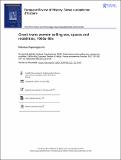Files in this item
Greek trans women selling sex, spaces and mobilities, 1960s-80s
Item metadata
| dc.contributor.author | Papadogiannis, Nikolaos | |
| dc.date.accessioned | 2022-03-31T12:30:13Z | |
| dc.date.available | 2022-03-31T12:30:13Z | |
| dc.date.issued | 2022-06-01 | |
| dc.identifier | 276905784 | |
| dc.identifier | deb7e531-36ea-4c98-a2f2-a920e5705ecb | |
| dc.identifier | 85127561379 | |
| dc.identifier | 000776627400010 | |
| dc.identifier.citation | Papadogiannis , N 2022 , ' Greek trans women selling sex, spaces and mobilities, 1960s-80s ' , European Review of History: Revue européenne d'histoire , vol. 29 , no. 2 , pp. 331-362 . https://doi.org/10.1080/13507486.2021.2013447 | en |
| dc.identifier.issn | 1350-7486 | |
| dc.identifier.other | ORCID: /0000-0002-3521-8152/work/110912057 | |
| dc.identifier.uri | https://hdl.handle.net/10023/25129 | |
| dc.description.abstract | This article shows how sex work, gender identity and spatial mobilities were entangled for Greek trans women selling sex. Selling sex, particularly as trans women, exposed them to severe threats due to restrictive legislation and bias against them. Nevertheless, sex work could also be an empowering experience, facilitating their gender transitioning and helping them develop professional self-esteem. Greek trans women selling sex experienced such barriers and empowerment between the 1960s and early 1980s. Thus, contrary to the powerful argument in the history of sexuality, the late 1970s witnessed no ‘turn inwards’ for them. Selling sex as a pathway to gender transitioning was a process situated in specific spaces and facilitated by mobilities. Gender transitioning through sex work transpired in niches that trans women selling sex carved out in Athens and Salonica from the 1960s on. Simultaneously, movement across space had a complex and, sometimes, cumulative effect on sex work as a road to gender transitioning. Individuals engaging in the latter process relocated within the urban centres or from villages and provincial towns to the large cities of Greece, populating the abovementioned niches. In these niches, they exchanged information on locations outside of Greece. Subsequently, some trans women travelled to Casablanca to undergo gender-affirming surgery and/or migrated to West Berlin to sell sex. Such cross-border mobility had an ambiguous impact on the link between sex work and gender transitioning for Greek trans women, sometimes consolidating it and sometimes helping weaken it. In exploring the experience of Greek trans women in West Berlin, the article also contributes to the conjoined study of sex work, on the one hand, and migration from Greece to West Germany, on the other, which historians have hitherto primarily analysed separately from one another. | |
| dc.format.extent | 32 | |
| dc.format.extent | 906474 | |
| dc.language.iso | eng | |
| dc.relation.ispartof | European Review of History: Revue européenne d'histoire | en |
| dc.subject | Sex work | en |
| dc.subject | Gender transitioning | en |
| dc.subject | Spaces | en |
| dc.subject | Mobilities | en |
| dc.subject | Greece | en |
| dc.subject | West Germany | en |
| dc.subject | Casablanca | en |
| dc.subject | DD Germany | en |
| dc.subject | DF Greece | en |
| dc.subject | HT Communities. Classes. Races | en |
| dc.subject | RA Public aspects of medicine | en |
| dc.subject | 3rd-DAS | en |
| dc.subject | MCC | en |
| dc.subject.lcc | DD | en |
| dc.subject.lcc | DF | en |
| dc.subject.lcc | HT | en |
| dc.subject.lcc | RA | en |
| dc.title | Greek trans women selling sex, spaces and mobilities, 1960s-80s | en |
| dc.type | Journal article | en |
| dc.contributor.institution | University of St Andrews. School of History | en |
| dc.identifier.doi | 10.1080/13507486.2021.2013447 | |
| dc.description.status | Peer reviewed | en |
This item appears in the following Collection(s)
Items in the St Andrews Research Repository are protected by copyright, with all rights reserved, unless otherwise indicated.

